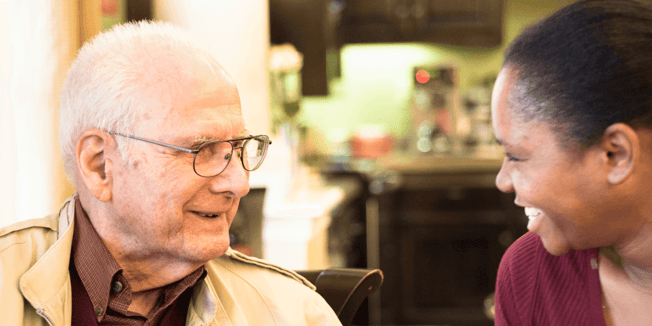Memory Care Explained: Understanding Solutions That Make a Difference
Memory care solutions have become a vital resource for people facing cognitive problems, such as Alzheimer's and mental deterioration. These specialized programs not only provide safe and secure environments and trained staff but additionally include customized tasks that improve cognitive involvement and psychological well-being. Comprehending the selection of therapies and support group available is very important for households steering through these complex choices. As we discover the numerous parts that add to efficient memory care, it comes to be clear that the best choices can significantly impact the top quality of life for both residents and their family members.
Overview of Memory Care

Specialized Therapies Available
Numerous specialized therapies are offered within memory care solutions, each customized to attend to the distinct obstacles dealt with by individuals with cognitive problems. These treatments aim to improve cognitive functioning, promote psychological health, and enhance overall quality of life.One utilized technique is memory treatment, which urges people to review past experiences with photos, songs, and acquainted things. This approach can stimulate memories, boost conversation, and foster links with caretakers and peers.Another reliable treatment is cognitive excitement therapy (CST), developed to engage people in psychological workouts that promote cognitive skills and social communication. CST sessions typically involve challenges, quizzes, and discussions, providing structured cognitive obstacles that aid preserve mental agility.Art and music treatment are also indispensable elements of memory care. These therapies utilize innovative expression to help with communication and psychological release, often profiting those that might deal with verbal communication.Additionally, animal-assisted therapy has actually gained acknowledgment for its capacity to minimize anxiety and promote social interaction through the visibility of treatment pets. Collectively, these specialized therapies play a vital function in enhancing the lives of people with memory problems, cultivating an encouraging and enriching atmosphere.
Involving Activities and Programs
Involving tasks and programs play an important duty in memory care services, supplying people promoting chances that advertise cognitive engagement and social interaction. Tailored to the distinct demands of locals, these activities consist of arts and crafts, music therapy, memory games, and physical workouts. Such programs are developed not just to enhance cognitive function yet also to foster a sense of achievement and community (Memory Care Charlotte).Social communication is an essential element of memory care, as it aids decrease sensations of isolation and depression typically experienced by individuals with memory disabilities. Group tasks urge communication and collaboration, creating an environment where citizens can share experiences and build relationships.Moreover, involving tasks can be adapted to differing degrees of cognitive capacity, making certain that all participants can take part meaningfully. Employee learnt memory care assist in these programs, giving support and support tailored to every individual's capabilities.Incorporating familiar routines and rate of interests right into these activities can additionally enhance their effectiveness, aiding citizens attach with their past and maintain a sense of identity. Overall, an all-round range of interesting activities enhances the lives of those in memory care, contributing to their total health and lifestyle
Significance of Household Assistance

Selecting the Right Facility
Picking the right memory care center is a crucial choice that needs cautious consideration of various factors. First, assess the level of care your loved one requirements. Facilities differ in their offerings, from standard aid to specialized memory care programs customized for problems such as Alzheimer's and various other dementias.Next, think about the setting of the facility. An inviting, safeguard, and comfy environment can significantly influence a citizen's wellness. Check out potential centers to evaluate their sanitation, security attributes, and overall atmosphere. Observe staff communications with locals, as thoughtful and skilled caretakers are basic to top quality care.Additionally, inquire about the center's staffing proportions and certifications. Memory Care Charlotte. Adequate staffing assurances individualized attention and prompt reactions to citizens' demands. Review the schedule of activities and programs that promote interaction, socialization, and cognitive stimulation, as these are critical for keeping lifestyle
Regularly Asked Inquiries
What Is the Price of Memory Care Providers?
The price of memory care solutions differs substantially based on place, facility type, and degree of care needed. Usually, households can anticipate to pay between $4,000 and $7,000 monthly - Alzheimer’s Care. These expenses commonly include real estate, meals, individual care, and customized support for memory-related problems. It is crucial for family members to research study choices extensively and think about economic aid programs, insurance policy protection, and potential long-lasting care planning to take care this content of these expenses efficiently

How Is Team Educated to Handle Memory Care Homeowners?
Staff training for memory care citizens is complete and specialized, concentrating on understanding the one-of-a-kind requirements of people with cognitive problems. Programs typically consist of education and learning on dementia-related conditions, interaction techniques, actions monitoring, and psychological assistance methods. Training likewise emphasizes the value of developing a safe and stimulating environment. Continuous education and hands-on experience warranty personnel are furnished to offer thoughtful care, fostering self-respect and respect for homeowners while advertising their general wellness.
Are Memory Care Facilities Licensed and Controlled?
Yes, memory care centers undergo licensing and regulatory oversight, which varies by state - Alzheimer’s Care. These laws assure that facilities meet particular criteria connected to safety and security, care quality, staffing, and resident rights. Normally, state health divisions or regulative bodies perform inspections and check compliance to secure locals with memory impairments. Prospective homeowners and families should verify a center's licensing standing and regulative history to establish adequate care and support solutions are offered
Can Residents Individualize Their Living Areas?
Yes, homeowners in memory care facilities commonly have the chance to individualize their living spaces. This personalization may include selecting decorations, arranging furniture, or presenting personal possessions, which can assist produce a sense of familiarity and comfort. Such modification is encouraged to advertise individuality and enhance the emotional well-being of residents. Any type of alterations are generally subject to facility standards to guarantee safety and maintain a helpful setting for all locals.
What Are the Going To Hours for Family Members?
Visiting hours for member of the family are usually established to guarantee that locals obtain suitable care while maintaining significant connections with their loved ones. These hours may vary by facility, yet generally, visitation is allowed during assigned times, usually in the mid-day and very early evening. Alzheimer’s Care. It is recommended for relative to confirm details checking out hours with the facility to ensure compliance with any kind of policies in position, as well as to improve the total experience for both locals and visitors
Comments on “How Memory Care Creates a Supportive Environment for Seniors”